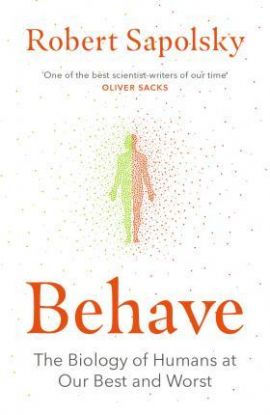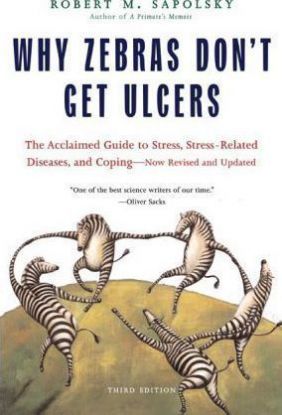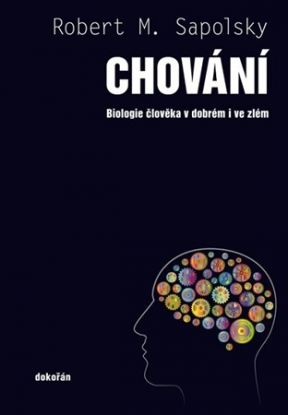Robert M. Sapolsky
autor
Behave - The Biology of Humans at Our Best and Worst
Why do we do what we do? Behave is at once a dazzling tour and a majestic synthesis of the whole science of human behaviour. Brought to life through simple language, engaging stories and irreverent wit, it offers the fullest picture yet of the origins of tribalism and xenophobia, hierarchy and competition, morality and free will, war and peace. Robert Sapolsky's ingenious method is to move backwards in time from the moment at which a behaviour occurs, layer by layer through the myriad influences that led to it: - We begin with the split-second reactions of the brain and nervous system...Then we consider our response to sight, sound and smell in the minutes and seconds beforehand...Next he explains the interactions of hormones, which prime our behaviour in the preceding hours and days...He proceeds through the experiences of adolescence, childhood and foetal development that shape us over our lifespans...And continues over centuries and millennia through the profound influences of genetic inheritance, cultural context and ultimately the evolutionary origins of our species. Throughout, Sapolsky considers the most important question: what causes acts of aggression or compassion?What inspires us to terrible deeds and what might help foster our best behaviour? Wise, humane, often very funny, Behave is a towering achievement, powerfully humanizing, that is unlikely to be surpassed for many years
Vypredané
23,70 €
24,95 €
Behave
Why do human beings behave as they do? We are capable of savage acts of violence but also spectacular feats of kindness: is one side of our nature destined to win out over the other? Every act of human behaviour has multiple layers of causation, spiralling back seconds, minutes, hours, days, months, years, even centuries, right back to the dawn of time and the origins of our species. In the epic sweep of history, how does our biology affect the arc of war and peace, justice and persecution? How have our brains evolved alongside our cultures? This is the exhilarating story of human morality and the science underpinning the biggest question of all: what makes us human?
Why Zebras Dont Get Ulcers
Now in a third edition, Robert M. Sapolsky's acclaimed and successful Why Zebras Don't Get Ulcers features new chapters on how stress affects sleep and addiction, as well as new insights into anxiety and personality disorder and the impact of spirituality on managing stress. As Sapolsky explains, most of us do not lie awake at night worrying about whether we have leprosy or malaria. Instead, the diseases we fear - and the ones that plague us now - are illnesses brought on by the slow accumulation of damage, such as heart disease and cancer. When we worry or experience stress, our body turns on the same physiological responses that an animal's does, but we do not resolve conflict in the same way - through fighting or fleeing. Over time, this activation of a stress response makes us literally sick. Combining cutting-edge research with a healthy dose of good humour and practical advice, Why Zebras Don't Get Ulcers explains how prolonged stress causes or intensifies a range of physical and mental afflictions, including depression, ulcers, colitis, heart disease, and more. It also provides essential guidance to controlling our stress responses.
This new edition promises to be the most comprehensive and engaging one yet.
Chování
Proč se chováme tak, jak se chováme? Tuto otázku se pokoušeli zodpovědět mnozí badatelé a už rozmanitost způsobů, pomocí nichž ji lze uchopit, naznačuje, že se jedná o úkol velmi zapeklitý. Jedni se zaměřují na neurobiologii, jiní se soustředili hormony, další preferují geny, někteří zase kladou na první místo výchovu či další vlivy prostředí, které na nás přímo či zprostředkovaně působí už od okamžiku početí. Všechno jsou to ale jen škatulky, které společně tvoří jediný celek. Ten ve své monumentální knize rozplétá americký biolog Robert Sapolsky, jenž čtenáři představuje původ našeho chování od prvních sekund, v nichž hraje hlavní roli aktivita různých oblastí mozku, přes hodiny až dny, kdy jsou stěžejní hormony, až k tisícům a milionům let, během nichž naše chování formovala evoluce. Autor se však neomezuje jen na holý biologický popis a dokládá, že na naše chování působí nespočet faktorů, o nichž často nemáme ani tušení a jejichž prostřednictvím lze naší zdánlivou racionalitou snadno manipulovat, což má často tragické důsledky. Pokud si ale naše slabosti i přednosti uvědomíme, můžeme se alespoň pokusit jednat správně, byť to leckdy nebývá vůbec snadné.
Vypredané
46,98 €
49,45 €
dostupné aj ako:
Chování
Proč se chováme tak, jak se chováme? Tuto otázku se pokoušeli zodpovědět mnozí badatelé a už rozmanitost způsobů, pomocí nichž ji lze uchopit, naznačuje, že se jedná o úkol velmi zapeklitý. Jedni se zaměřují na neurobiologii, jiní se soustředili hormony, další preferují geny, někteří zase kladou na první místo výchovu či další vlivy prostředí, které na nás přímo či zprostředkovaně působí už od okamžiku početí. Všechno jsou to ale jen škatulky, které společně tvoří jediný celek. Ten ve své monumentální knize rozplétá americký biolog Robert Sapolsky, jenž čtenáři představuje původ našeho chování od prvních sekund, v nichž hraje hlavní roli aktivita různých oblastí mozku, přes hodiny až dny, kdy jsou stěžejní hormony, až k tisícům a milionům let, během nichž naše chování formovala evoluce. Autor se však neomezuje jen na holý biologický popis a dokládá, že na naše chování působí nespočet faktorů, o nichž často nemáme ani tušení a jejichž prostřednictvím lze naší zdánlivou racionalitou snadno manipulovat, což má často tragické důsledky. Pokud si ale naše slabosti i přednosti uvědomíme, můžeme se alespoň pokusit jednat správně, byť to leckdy nebývá vůbec snadné.
Predaj skončil
18,49 €
dostupné aj ako:
Lacná kniha Chování (-50%)
Proč se chováme tak, jak se chováme? Tuto otázku se pokoušeli zodpovědět mnozí badatelé a už rozmanitost způsobů, pomocí nichž ji lze uchopit, naznačuje, že se jedná o úkol velmi zapeklitý. Jedni se zaměřují na neurobiologii, jiní se soustředili hormony, další preferují geny, někteří zase kladou na první místo výchovu či další vlivy prostředí, které na nás přímo či zprostředkovaně působí už od okamžiku početí. Všechno jsou to ale jen škatulky, které společně tvoří jediný celek. Ten ve své monumentální knize rozplétá americký biolog Robert Sapolsky, jenž čtenáři představuje původ našeho chování od prvních sekund, v nichž hraje hlavní roli aktivita různých oblastí mozku, přes hodiny až dny, kdy jsou stěžejní hormony, až k tisícům a milionům let, během nichž naše chování formovala evoluce. Autor se však neomezuje jen na holý biologický popis a dokládá, že na naše chování působí nespočet faktorů, o nichž často nemáme ani tušení a jejichž prostřednictvím lze naší zdánlivou racionalitou snadno manipulovat, což má často tragické důsledky. Pokud si ale naše slabosti i přednosti uvědomíme, můžeme se alespoň pokusit jednat správně, byť to leckdy nebývá vůbec snadné.
Vypredané
24,73 €
49,45 €
dostupné aj ako:
Determined
The legendary author of Behave shows that free will can not exist and explores the radical and disturbing implications
In a masterful synthesis of science and philosophy, one of the world's pre-eminent behavioural scientists demonstrates that free will is a powerful and dangerous illusion. The result is a new way to think about choice, identity, responsibility, justice, morality and how we live together.
Without free will, it makes no more sense to punish people for antisocial behaviour than it does to scold a car for breaking down. It is no one's fault they are poor or overweight or unsuccessful, nor do people deserve praise for their talent or hard work; 'grit' is a myth. This mechanistic view of human behaviour challenges our most powerful instincts, but history suggests that we have already made great strides toward it- where once we saw demonic possession or cowardice, for example, now we diagnose illness or trauma and offer help.
Disturbing and liberating in equal measure, Determined explores the far-reaching implications for society of accepting this reality. Monumentally difficult as it may be, the reward will be a far more just and humane world.











